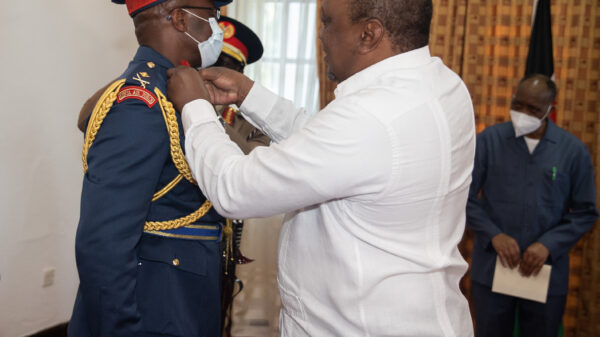By Bridgit Kurgat, Programs Manager, Days for Girls International and Dr. Ademola Olajide, UNFPA Representative, Kenya
Despite menstruation being a deeply private and sensitive topic and one that is not often spoken about in public, Menstrual Hygiene Day, celebrated on May 28th, gives an opportunity to shed light on the inequality that girls and women experience because of menstruation.
A day like today in 2020, the Kenyan government launched its first Menstrual Hygiene Management Policy. It subsequently published a Kenyan Reusable Sanitary Towels Standard later in the year to offer girls and women choices. These steps showed that menstrual equity is a critical factor for the advancement of the country given that menstrual health has a direct impact on the economy and the education sector.
On average, a woman menstruates for about 3,000 days in her lifetime. However, globally, an estimated 500 million women and girls lack adequate menstrual health resources to manage their periods. Without menstrual products, supportive infrastructure such as toilets and water, and appropriate health education, women and girls face significant restrictions in their life.
Menstrual stigma and taboos also hinder gender equality in many ways, as periods have been used as a reason to exclude women from social, economic and religious activities in societies around the world
Despite menarche being a biological process worth celebrating, it means a rite of passage in to adulthood some communities, which can only be complete through Female Genital Mutilation (FGM). FGM is a practice that involves altering or injuring the female genitalia for non-medical reasons and UNFPA estimates that 68 million girls are at risk of being mutilated by 2030.
FGM leads to obstruction of the vaginal opening which may lead to severe menstruation, irregular menses and difficulty in passing menstrual blood. Some women and girls end up having menstrual flow for up to 14 days and by the time they are done with their cycle another is about to start.
This means that some girls miss out going to school for up to one week due to severe pain or the need to escape physical exercises stipulated in the school curriculum. Further, women and girls who have undergone the cut may shy off from seeking gynecological services in the event of menstrual disorders. This is due to the stigma and trauma from the practice and extreme health consequences resulting from lack of treatment of these disorders.
The situations described above cause psychological and physiological torture to women and girls and go against the new definition of menstrual health, which is described as a state of complete physical, mental and social well-being and not merely the absence of disease or infirmity in relation to menstrual cycle.
To this regard, Days for Girls International and UNFPA’s call for action this year is for partners in menstrual health and hygiene and anti- FGM actors to support programs geared towards educating communities on menstrual health and enrolling men as allies. Involvement of men means that they are able to comprehend how FGM impacts girls and women’s menstrual health, and some of the devastating consequences that occur as a result.
This year, we choose to celebrate women such as Dr. Susan Chebet who chose to take action through research and implementation on alternative rite of passage for girls that excluded the cut dubbed tumdo ne leel (new rite of passage – FGM).
It is imperative that those who menstruate are provided with the necessary information, resources and support to manage their menstrual needs throughout their lifetime — from menarche to menopause.
The policy amendment to the Education Act, signed into law in June 2017, states that “free, sufficient and quality sanitary towels” must be provided to every girl registered at school, as well as “a safe and environmentally sound mechanism for disposal”. The Government of Kenya is commended for being proactive in advocacy and policy initiatives in the area of menstrual health. They include the Presidential policy on menstrual hygiene management, removal of VAT on sanitary products, and publication of product standards for reusable pads.
To support transformative policies and innovate community-led solutions like the above, we call upon the national and county governments, NGO’s, Faith-Based organizations and all stakeholders to combine efforts in supporting menstrual health education. Creating more awareness will advance the well-being of women and girls, which in turn leads to healthier families and communities.
























































